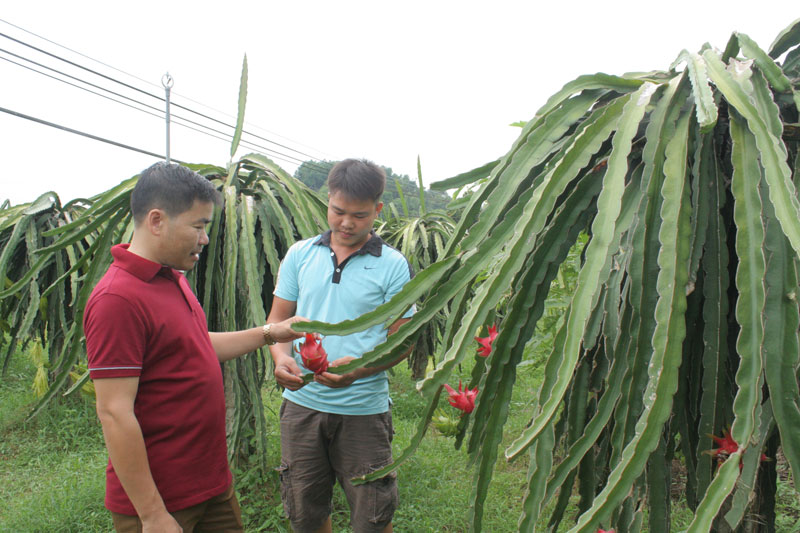
(HBO) – Everyone in Dong Bac commune knows Secretary of the local Party committee Bui Van Binh. Binh, born in 1962, is the first one who succeeded in growing dragon fruit in the commune.

Leaders of the Dong Bac People’s Committee visit Binh’s dragon
fruit farm.
Binh said his
family owns over 3,000 square metres of land. Earlier, his family grew rice,
but the water shortage forced them to switch to sugarcane and corn. However, the
cultivation brought unstable income.
In 2015, Binh
heard in the media about a farming model in Suoi Soi, Lac Thuy district
invested by Tran Hung from Hanoi. The model combined the cultivation of flower
and dragon fruit with tourism. He then came to the site to learn more about the
model and brought home dragon saplings in Lac Thuy.
"At first, I tested
cultivating both white- and red-flesh dragon fruits on 2,000 square metres. They
grew well and, in 2016, I planted 420 more saplings on more than 1,000 square
metres.”
Talking about
difficulties in their early days planting dragon fruit, Binh’s wife Bui Thi
Chau said: With support from relatives and friends, he built 420 concrete
columns along with an irrigation system using water from drilled well. Our
efforts have paid off, when the plants produced the first fruits in 2016. That
year we earned 30 million VND. In 2017, my family harvested about 4-5 tonnes of
fruit, gaining 70 million VND. This year is our third year of harvesting dragon
fruit, with the average selling price reaching 20-25,000 VND per kg and revenue
estimated at over VND100 million./.
Dao Village’s honey – a product certified with a 3-star OCOP (One Commune One Product) rating by Thong Nhat Agricultural Cooperative in Dao Village (Hoa Binh City) – is highly regarded by consumers for its quality, richness, and variety in packaging. The distinctively sweet taste of Dao Village’s honey leaves a lasting impression on anyone who has tried it.
In alignment with Project No. 07-DA/TU, issued by the Hoa Binh provincial Party Committee on November 1, 2021, Lac Thuy district has actively promoted investment and supported the sustainable development of its industrial and handicraft sectors during the 2021–2025 period. Alongside this, the district has remained committed to preserving and revitalising traditional craft villages.
Located in the northern part of Lac Thuy district, with a temperate climate and fertile soil, Phu Thanh commune has great potential and advantages in growing tea. The long-standing experience, combined with strict adherence to organic farming practices in the tea gardens, ensures that the dried tea products from Phu Thanh and Lac Thuy as a whole are sold out immediately upon production, providing a stable and prosperous life for the local people.
Amid efforts to streamline the administrative apparatus, Hoa Binh province has intensified measures to address challenges in land clearance, resettlement support, and infrastructure investment, aiming to speed up the progress of key projects.
Hoa Binh province has posted an unprecedented economic growth rate of 12.76% in the first quarter of 2025, marking its highest quarterly performance to date and positioning it as the second fastest-growing locality in the country, trailing only Bac Giang province.
Under current regulations, products in the One Commune – One Product (OCOP) programme that are rated three stars or higher must undergo re-evaluation every three months. However, in reality, some of these products fail to consistently meet the required standards, raising concerns about the sustainability of their OCOP certification. This underscores the urgent need for producers to enhance product quality and gradually develop their OCOP products into strong, marketable brands.



